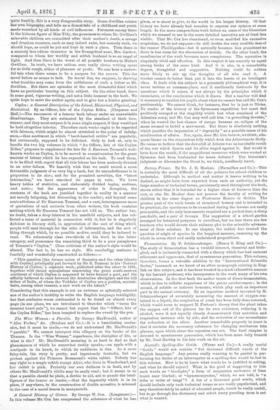given, or is about to give, to the world in
his larger history. Of that history we have already had occasion to express our opinion at some length. In the more compendious work before us, some of the blemishes which we seemed to see in the more detailed narrative are at least less visible. That Mr. Cox has abandoned, or even modified his excessive scepticism, we do not suppose—he still doubts the very credible feat of the runner Pheidippides—but it naturally becomes less prominent as there is less room for the discussion of details. On the other hand, the excellencies of the work becomes more conspicuous. The narrative is singularly vivid and effective. In this respect it has scarcely an equal among books of the same kind. And it is also, in a remarkable degree, thoughtful and suggestive. Nothing could be written more likely to stir up the thoughts of all who read it. A teacher cannot do better than put it into the hands of an intelligent class. It deals with the subject in a genuinely philosophical way, It is never tedious or common-place, and it continually instructs by the questions which it raises, if not always by the principles which it enunciates, or the conclusions which it draws. But a teaoher will find it necessary to caution his pupils about what we cannot but call Mr. Cox's partisanship. We c_annot think, for instance, that he is just to Nicias. No reader of the history of the Syracusan expedition but must feel positively enraged at the stupidity which lost what remained of the Athenian army, and Mr. Cox may well call him " a grovelling devotee," when he wasted the last chance of escape because an.eolipse of the moon seemed to forbid a movement. But there is absolutely nothing which justifies the imputation of " depravity " as a possible cause of his misdirection of affairs. Nor, again, does Mr. Cox bestow, we think, ade- quate blame on the stupendous folly which took the Athenians to Sicily. He seems to believe that the downfall of Athens was an inevitable result of the war which Sparta and its allies waged against it. But would it have been the result, if the magnificent resources which wore wasted at Syracuse had been husbanded for home defence ? The historian's judgment on Alexander the Great is, we think, needlessly harsh.


































 Previous page
Previous page